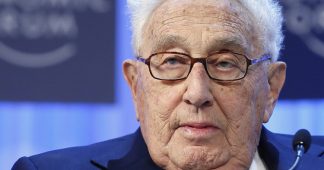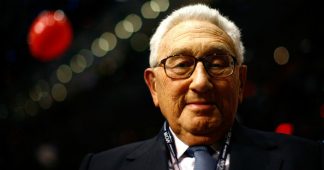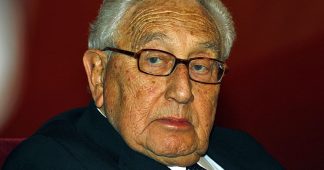Henry Kissinger, 1st Jewish secretary of state, iconic Cold War diplomat, dies at 100
30 November 2023
Henry Kissinger, the controversial diplomat responsible for some of the United States’ most pivotal foreign policy decisions during the Cold War, died Wednesday at his home in Connecticut. He was 100 years old.
A mainstay in the presidential administrations of Richard Nixon and Gerald Ford, Kissinger served Nixon as national security adviser, and later secretary of state. He played a central role in Nixon’s diplomatic agenda, and led the way on American rapprochement with China and the relaxation of tensions with the Soviet Union in a major break from the conventional wisdom of containment that held sway at the time.
Due to his cold, calculating style of diplomacy, which prioritized national interests over humanitarian ones, Kissinger’s name has become almost synonymous with realpolitik.
Continue reading at www.timesofisrael.com
Henry Kissinger, America’s Most Notorious War Criminal, Dies At 100
By and
Henry Kissinger — who as a top American foreign policy official oversaw, overlooked and at times actively perpetrated some of the most grotesque war crimes the United States and its allies have committed — died Wednesday at his home in Connecticut. He was 100 years old.
Kissinger’s death was announced by his consulting firm on Wednesday evening. No cause of death was immediately given
Kissinger served as secretary of state and national security adviser under Presidents Richard Nixon and Gerald Ford, positions that allowed him to direct the Vietnam War and the broader Cold War with the Soviet Union, and to implement a stridently “realist” approach that prioritized U.S. interests and domestic political success over any potential atrocity that might occur.
The former led to perhaps the most infamous crime Kissinger committed: a secret four-year bombing campaign in Cambodia that killed an untold number of civilians, despite the fact that it was a neutral nation with which the United States was not at war.
Continue reading at www.huffpost.com
Henry Kissinger: The Declassified Obituary
Nov 29, 2023
Washington, D.C., November 29, 2023 – Henry Kissinger’s death today brings new global attention to the long paper trail of secret documents recording his policy deliberations, conversations, and directives on many initiatives for which he became famous—détente with the USSR, the opening to China, and Middle East shuttle diplomacy, among them.
This historical record also documents the darker side of Kissinger’s controversial tenure in power: his role in the overthrow of democracy and the rise of dictatorship in Chile; disdain for human rights and support for dirty, and even genocidal, wars abroad; secret bombing campaigns in Southeast Asia; and involvement in the Nixon administration’s criminal abuses, among them the secret wiretaps of his own top aides.
To contribute to a balanced and more comprehensive evaluation of Kissinger’s legacy, the National Security Archive has compiled a small, select dossier of declassified records—memos, memcons, and “telcons” that Kissinger wrote, said and/or read—documenting TOP SECRET deliberations, operations and policies during Kissinger’s time in the White House and Department of State.
Continue reading at nsarchive.gwu.edu
Republican lawmakers mourn American diplomat Henry Kissinger
by Miranda Nazzaro
Nov 29, 2023
Reactions poured in from several Republican lawmakers over the death of former diplomat and presidential adviser Henry Kissinger on Wednesday, with tributes highlighting the former statesman’s legacy on foreign policy.
Kissinger died at his home in Connecticut at the age of 100 on Wednesday.
House Speaker Mike Johnson (R-La.) said Kissinger’s contributions to U.S. foreign policy and global diplomacy are “immeasurable.”
“A refugee of Nazi Germany, WWII veteran, and Nobel recipient—his life was one of a kind. As a confidant to multiple presidents, he was one of the most consequential figures of the 20th century,” Johnson wrote in a post on X, formerly Twitter.
“Kissinger was a statesman who devoted his life in service to the United States, and should be remembered for his efforts to ensure global peace and freedom abroad,” the Speaker continued.
Continue reading at thehill.com
Does Henry Kissinger Have a Conscience?
Last March, when President Obama travelled to Argentina to meet with the country’s new President, Mauricio Macri, his public appearances were dogged by protesters who noisily demanded explanations, and apologies, for U.S. policies, past and present. There are few countries in the West where anti-Americanism is as vociferously expressed as in Argentina, where a highly politicized culture of grievance has evolved in which many of the country’s problems are blamed on the United States. On the left, especially, there is lingering resentment over the support extended by the U.S. government to Argentina’s right-wing military, which seized power in March of 1976 and launched a “Dirty War” against leftists that took thousands of lives over the following seven years.
Obama’s visit coincided with the fortieth anniversary of the coup. He pointedly paid homage to the Dirty War’s victims by visiting a shrine built in their honor on the outskirts of Buenos Aires. In an address he gave at the shrine, Obama acknowledged what he characterized as American sins of omission, but he stopped short of issuing an outright apology. “Democracies have to have the courage to acknowledge when we don’t live up to the ideals that we stand for,” he said. “And we’ve been slow to speak out for human rights, and that was the case here.”
Continue reading at www.newyorker.com
White House 1974 Cyprus Meeting: Kissinger Backed Turkey Over Greece
Sep. 4, 2018
A day before a second invasion wave of Turkish forces on Cyprus in 1974, Secretary of State Henry Kissinger told President Gerald Ford – in office only four days after Richard Nixon resigned, facing impeachment over Watergate – that if Greece went to war with Turkey that America should back the Turks and that they were entitled to seize part of the island.
A file exempt from declassification, from the National Security Adviser’s Memoranda of Conversation Collection at the Gerald R. Ford Presidential Library, shown on the Hellenic American Leadership Council (HALC) blog revealed Kissinger’s bias and favoritism toward Turkey, backing up long-held assertions he had implicitly supported Turkey’s invasion although the US was supporting a Greek military dictatorship that collapsed over Cyprus.
Minutes of the meeting showed that Kissinger was becoming anxious during a brief period of internationally-brokered peace talks in Geneva, Switzerland and that the Greeks were playing for time as Turkey was getting antsy.
Ford asked Kissinger, “What we do if the Turks moved?” and was told the US would have to vote against them in the United Nations Security Council.
“We would have our hands full to keep the Greeks from going to war. The Turks right now are extremely nationalistic. For a few years ago, the Turkish tactics are right – grab what they want and then negotiate on the basis of possession,” he said.
Continue reading at www.thenationalherald.com
The Trial of Henry Kissinger
The Trial of Henry Kissinger is a 2001 book by Christopher Hitchens which examines the alleged war crimes of Henry Kissinger, the National Security Advisor and later, the U.S. Secretary of State for Presidents Richard Nixon and Gerald Ford. Acting in the role of prosecutor, Hitchens presents Kissinger’s involvement in a series of alleged war crimes in Vietnam, Cambodia, Laos, Bangladesh, Chile, Cyprus and East Timor.
In the words of Hitchens, Kissinger deserves prosecution “for war crimes, for crimes against humanity, and for offenses against common or customary or international law, including conspiracy to commit murder, kidnap, and torture.” He further calls him “a stupendous liar with a remarkable memory.”
The book takes the form of a prosecutorial document, as Hitchens limits his critique to such charges as he believes might stand up in an international court of law following precedents set at Nuremberg and elsewhere. These link Kissinger to war casualties in Vietnam, massacres in Bangladesh and Timor, and assassinations in Chile, Cyprus, and Washington, D.C.
Continue reading at en.wikipedia.org
We remind our readers that publication of articles on our site does not mean that we agree with what is written. Our policy is to publish anything which we consider of interest, so as to assist our readers in forming their opinions. Sometimes we even publish articles with which we totally disagree, since we believe it is important for our readers to be informed on as wide a spectrum of views as possible.








